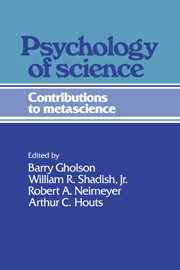Book contents
- Frontmatter
- Contents
- Preface
- Contributors
- 1 The psychology of science: An introduction
- Part I Historical issues in the psychology of science
- Part II The case for a psychology of science
- Part III Creativity and the psychology of science
- Part IV Cognition in the psychology of science
- Part V Social factors in the psychology of science
- Part VI Epilogue and Prologue
- 16 A preliminary agenda for the psychology of science
- Author index
- Subject index
16 - A preliminary agenda for the psychology of science
Published online by Cambridge University Press: 05 June 2012
- Frontmatter
- Contents
- Preface
- Contributors
- 1 The psychology of science: An introduction
- Part I Historical issues in the psychology of science
- Part II The case for a psychology of science
- Part III Creativity and the psychology of science
- Part IV Cognition in the psychology of science
- Part V Social factors in the psychology of science
- Part VI Epilogue and Prologue
- 16 A preliminary agenda for the psychology of science
- Author index
- Subject index
Summary
Research in the sociology of science has taught us that scientific specialties undergo characteristic changes in the course of their development. At their inception, they consist of little more than provocative sets of hypotheses being pursued by relatively isolated researchers working chiefly within the framework of an older, well-established discipline (Kuhn, 1970; Mulkay, 1979; Mullins, 1973). Gradually, however, networks of like-minded scientists begin to form, as they become aware that their converging interests differentiate them in important theoretical or methodological respects from the dominant paradigms of their parent discipline. Intellectually, this networking is often facilitated by the publication of a program statement that crystallizes promising directions to be pursued by the group (Mullins, 1973). The heightened ingroup communication that results may promote greater coherence in the research being conducted by clusters of researchers, and if conditions are favorable, may trigger a “publication explosion” in the group's scientific output (De Mey, 1981). Eventually, as the group's work gains recognition and institutional support, the field may become an established specialty in its own right (Mulkay, 1979). Research has suggested that this hypothesized developmental process is consistent with the evolution of both successful natural science (De Mey, 1981; Griffith & Mullins, 1972) and social science (Mullins, 1973; Neimeyer, 1985; Shadish & Reichardt, 1987) specialties.
We believe that the emerging specialty of psychology of science can be usefully construed in these terms.
- Type
- Chapter
- Information
- Psychology of ScienceContributions to Metascience, pp. 429 - 448Publisher: Cambridge University PressPrint publication year: 1989

